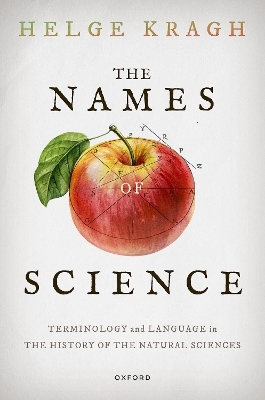
The Names of Science
Terminology and Language in the History of the Natural Sciences
Seiten
2024
Oxford University Press (Verlag)
978-0-19-891744-1 (ISBN)
Oxford University Press (Verlag)
978-0-19-891744-1 (ISBN)
The history of science is echoed in the development of its language and the names chosen for its technical terms. This book examines in detail how new words entered the scientific vocabulary and how some, but not all, have survived to the present.
The history of science is echoed in the development of its language and the names chosen for its technical terms. The Names of Science examines in detail how, over time, new words have entered the scientific lexicon and how some of them, but far from all, have survived to the present. Why is a transistor called a transistor and not something else? Why was the term 'scientist' only coined in 1834, and why was the name regarded as controversial for a long time afterwards?
There is a story behind every scientific word we use today. In this work, Helge Kragh tells many of these stories, taking a broad historical perspective from the Renaissance to the present. By combining elements of linguistics with the history of the natural sciences including physics, chemistry, and astronomy, this book offers a new and innovative perspective on the historical development of the natural sciences.
Following an introductory list of useful linguistic terms, the book is structured in six chapters, which cover important phases in the history of science, dealing with a vast range of scientific terminology from physics, chemistry, geology, astronomy, to cosmology. It also considers, if only briefly, how English - and not, say, Latin or French - developed to become the internationally accepted language of science.
Contrary to other works dealing with the subject, The Names of Science pays serious attention to the historical dimension of scientific language, and to the way in which scientists have, sometimes unconsciously, acted as linguists and neologists in their research work.
The history of science is echoed in the development of its language and the names chosen for its technical terms. The Names of Science examines in detail how, over time, new words have entered the scientific lexicon and how some of them, but far from all, have survived to the present. Why is a transistor called a transistor and not something else? Why was the term 'scientist' only coined in 1834, and why was the name regarded as controversial for a long time afterwards?
There is a story behind every scientific word we use today. In this work, Helge Kragh tells many of these stories, taking a broad historical perspective from the Renaissance to the present. By combining elements of linguistics with the history of the natural sciences including physics, chemistry, and astronomy, this book offers a new and innovative perspective on the historical development of the natural sciences.
Following an introductory list of useful linguistic terms, the book is structured in six chapters, which cover important phases in the history of science, dealing with a vast range of scientific terminology from physics, chemistry, geology, astronomy, to cosmology. It also considers, if only briefly, how English - and not, say, Latin or French - developed to become the internationally accepted language of science.
Contrary to other works dealing with the subject, The Names of Science pays serious attention to the historical dimension of scientific language, and to the way in which scientists have, sometimes unconsciously, acted as linguists and neologists in their research work.
Helge Kragh has worked as Professor of History of Science at the University of Oslo, Norway, and Aarhus University, Denmark, and is presently Emeritus Professor at the University of Copenhagen. Since 2001 he has been a member of the Royal Danish Academy of Sciences and Letters, and 2008-2010 he served as President of the European Society for History of Science. Most of his research has focused on the historical development of post-1800 physics, chemistry, astronomy, and cosmology.
Preface
Introduction: Some linguistic terms
1: Issues of science, history, and language
2: Electicity and electromagnetism
3: Fundamental particles
4: More physics names
5: Worlds and words of chemistry
6: Heavenly sciences
Bibliography
Index
| Erscheinungsdatum | 05.07.2024 |
|---|---|
| Zusatzinfo | 10 b/w figures |
| Verlagsort | Oxford |
| Sprache | englisch |
| Maße | 157 x 17 mm |
| Gewicht | 592 g |
| Themenwelt | Geisteswissenschaften ► Sprach- / Literaturwissenschaft ► Sprachwissenschaft |
| Naturwissenschaften | |
| ISBN-10 | 0-19-891744-9 / 0198917449 |
| ISBN-13 | 978-0-19-891744-1 / 9780198917441 |
| Zustand | Neuware |
| Informationen gemäß Produktsicherheitsverordnung (GPSR) | |
| Haben Sie eine Frage zum Produkt? |
Mehr entdecken
aus dem Bereich
aus dem Bereich
Das umfassende Standardwerk auf der Grundlage der aktuellen amtlichen …
Buch | Hardcover (2024)
Duden (Cornelsen Verlag)
CHF 48,95


